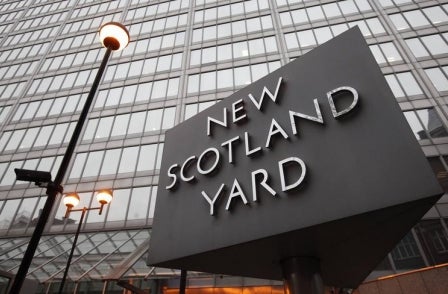
Two top Scotland Yard officers tried to shut down their force’s investigation into Whitehall leaks to Tory MP Damian Green, the Leveson Inquiry heard yesterday.
Former Metropolitan Police commissioner Sir Paul Stephenson and former assistant commissioner John Yates both urged Bob Quick, the officer in charge of the case, to drop the probe.
Yates said the 2008-09 investigation into Home Office leaks was “doomed” and advised former assistant commissioner Quick to “cut his losses”, the press standards inquiry was told.
Quick also claimed that Sir Paul, then acting commissioner, told him on December 1 2008 that he had “written out his resignation” amid political and media furore about the Met’s arrest of Mr Green.
He said: “I was surprised and quite shocked at that remark because I couldn’t see that the police were doing anything other than their duty to investigate what were very serious allegations from a Government department.”
The Leveson Inquiry also heard that Yates denied fellow police officers access to his phone records in a separate leak investigation because he was “very well connected”.
And Quick said ex-senior Met officer Andy Hayman refused in 2000 to launch an investigation into allegations that journalists were paying corrupt police officers up to £2,000 for stories about celebrities.
There was outcry when detectives arrested Mr Green, then shadow immigration minister, on November 27 2008 as part of the Home Office leaks probe.
Quick said he was particularly concerned by criticism from London Mayor Boris Johnson, then chairman of the Metropolitan Police Authority.
At this time Yates told him the investigation was “doomed” and that the Crown Prosecution Service (CPS) would withdraw their support, advising him to stop the inquiry and “cut his losses”.
Quick said: “I was surprised he asked me to drop it at that point because we had just seized a load of evidence that we didn’t have the opportunity to examine at that point.
“And clearly to stop the inquiry at that time would have consequences if later it was established that there had indeed been more serious leaks.”
The former policeman said there was “an air of semi-panic” when Sir Paul invited then-British Transport Police chief constable Sir Ian Johnston to carry out a two-week review of the Met’s investigation.
‘I did not think it justifiable or ethical’
On December 6 2008 Quick, Sir Paul and then-deputy commissioner Tim Godwin were briefed about the preliminary findings of the Johnston review that police had the evidence to justify arresting Mr Green but arresting him was “disproportionate”.
Quick said in a statement to the Inquiry: “Almost immediately after the meeting, Stephenson came into my office and asked me to stop the investigation.
“I expressed the view that I did not think it justifiable or ethical to stop the investigation purely on the basis of a controversy that appeared not to be driven by the public, but by those who may have a vested interest in deterring the police from undertaking such investigation.”
The CPS announced in April 2009 that neither Green nor junior Home Office civil servant Christopher Galley would face prosecution over the leaks.
Mr Quick also said he saw Sir Paul, Mr Yates and Met director of public affairs Dick Fedorcio socialising in a wine bar near New Scotland Yard with journalists, including News of the World crime editor Lucy Panton and Sun crime editor Mike Sullivan.
On other occasions he saw Yates “in social situations” with Daily Mail crime correspondent Stephen Wright.
“I found it surprising that there was this level of social engagement in local wine bars or pubs,” he said.
Robert Jay QC, counsel to the Inquiry, suggested that senior Met officers may have briefed the press against their rivals after Lord Blair quit as commissioner in October 2008.
He said: “We have a combustible mix here because, to put it bluntly, there was a job open at the top, the commissioner had just gone, a number of powerful people are jockeying for position, who’s going to be the next commissioner?
“And this is one way, arguably – briefing behind the scenes – of improving your own position, knifing someone else or trying to get your friend in a better position to be the next commissioner.”
The inquiry heard that Quick was also asked to look into allegations that Yates, head of Scotland Yard’s highly sensitive cash-for-honours investigation in 2006-07, had leaked information to the media.
He suggested analysing Yates’s telephone records, but the officer did not agree to the move.
Quick said in his statement: “He refused, and when I pressed him he made the comment that he was ‘very well (or too well) connected’.
“When I questioned this remark, he emphasised, ‘no Bob, I’m very (emphasised) well connected’.”
He added: “I didn’t place huge significance on it at the time. I thought it was a bit of theatre. I sensed Assistant Commissioner Yates was clearly sensitive – as I think I would be – to an intrusive process like that.”
Neil Garnham QC, counsel for the Metropolitan Police, suggested that Sir Paul only indicated at the December 1 2008 meeting that he was not intending to renew his contract the following April.
Quick – who resigned in 2009 after accidentally displaying details of a secret operation to photographers as he entered Downing Street – replied: “I was led to believe he was about to resign.”
The Leveson Inquiry, sitting at the Royal Courts of Justice in London, was adjourned until Monday.
Email pged@pressgazette.co.uk to point out mistakes, provide story tips or send in a letter for publication on our "Letters Page" blog
